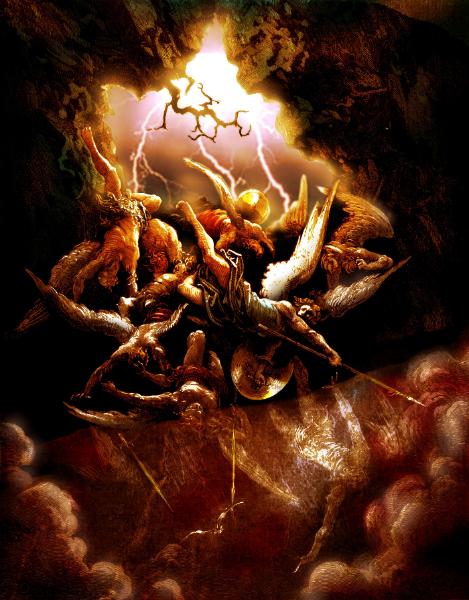![[Graphic of St. Jude]](https://www.deankwilson.com/Blog_images/St_Jude.jpg)
| 6And the angels who did not keep their positions of authority but abandoned their own home—these he has kept in darkness, bound with everlasting chains for judgment on the great Day. |
| —The Book of Jude |
In this series of blog posts, I intend to do my best to unpack this short Book of Jude. The Apostle Jude continues his letter to Christians gathered in the portion of the world that today we call Turkey. He continues to list a series of offences comparable to what he believes has afflicted the newly formed church. In the second example, he moves from the Rebellion of Korah to the Rebellion that took place in heaven when Lucifer tried to be God without God. You can find a record of this particular incident in Isaiah 14:12-15.

12 How you have fallen from heaven,
O morning star, son of the dawn!
You have been cast down to the earth,
you who once laid low the nations!
13 You said in your heart,
“I will ascend to heaven;
I will raise my throne
above the stars of God;
I will sit enthroned on the mount of assembly,
on the utmost heights of the sacred mountain.
14 I will ascend above the tops of the clouds;
I will make myself like the Most High.”
15 But you are brought down to the grave,
to the depths of the pit.
In this second example of godlessness unleashed, the Apostle Jude intends to prepare the true believers in the Lord Jesus Christ gathered in newly formed churches in Turkey for the hard work of taking a stand against corruption in the church. As I stated in my first blog post on this topic:
…As distasteful as the message the Apostle Jude intends to communicate to the fledgling church, it remains a powerful and timely warning for us today.
We often talk about corrupt politics, corrupt government, corrupt businesses, and sometimes even a corrupt church. The etymology of the word “corrupt” greatly informs the use of the word in our society today. The word “corrupt” comes from the idea that the “core” of someone or something has become “ruptured” or “burst apart from within.”
One cannot be God without God. Satan tried it. It cost him everything. Likewise, in the church, leaders cannot assume the role of God. Rather, they must bow in humility before the one true God and seek His leading. They must become people of the written Word. They must follow God’s commands in Scripture. They must become servant leaders. They must guard against impressing their human desires on the congregation they serve. They must approach every situation with seriousness and great care.
The Apostle Jude urgest the true believers to contend for the faith. To break up the corruption. To cast out those who incite dissent and division, just as God cast Satan, and all of the angels who followed him, out of heaven. This seems like a daunting task. But, as we continue our study of the Book of Jude, we will see other examples that the Apostle gives to bolster the courage of believers as they contend for the faith.
As I have stated repeatedly in this series of blog posts, on the one hand, we must strive to push back against those who desire to rupture the core of the church. On the other hand, we must do so with hearts full of God’s love, with an awareness of our own inherent sinfulness, and with total reliance on the leading of the Holy Spirit. And, as I will frequently state during this series of blog posts, that represents quite a challenge.
